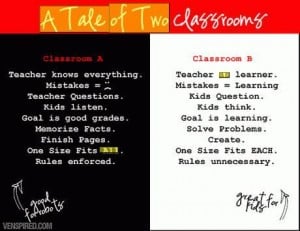I read this somewhere, someone may comment on its origin, “Will what I’m about to say bring me closer or push me away from the person with whom I’m communicating?” I try to keep that thought in the front of my mind all day at school. My wife and 2 year old daughter would say it tends to leave my mind on my way home! Either way, I like to think that’s my classroom management theme.
My teammates at school would say I’m ultra practical. I really am. It’s tough for me to buy into something that isn’t practical. For example, why should students come to my room first and ask to get a drink from the fountain, when they walk right by the fountain on their way to my room? Even little situations like that could become unnecessary situations if more teachers exercised some practicality in their classrooms. Just recently, I was asked why I don’t meet 1:1 with my students to discuss their end-of-the-year state-wide test results. The numbers don’t make sense to my students. They aren’t practical. If a student is 12 points away from the mastery level, what do 12 points really say? No one seems to know. That isn’t practical to me. Why discuss a student’s test score when neither he/she or I know what that score really means. I can discuss strengths and weaknesses with a student, but they probably already know those as well. Providing an opportunity to build on those strengths and weaknesses is what I’d like to talk about. Back on topic Mr. Oldfield!
Harry K. Wong emphasizes that classroom management is much more than discipline. Unfortunately, a lot of teachers think of effective classroom management as effective discipline. CM goes beyond discipline, it should be something that positively affects the entire classroom and everyone in it. When classroom problems arise, consider what you have done to prevent such a problem from arising? That’s a loaded question that requires reflection on the activity, assignment, instructional method, seating arrangement, location of the teacher and location of the student. Sometimes there just isn’t anything that could have been done to prevent it. When that’s the case, what did your reaction convey? Was your reaction one in which your students could clearly interpret? Did your reaction support the correct behavior?

